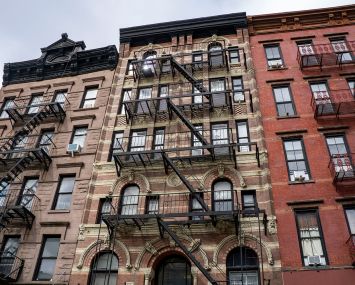If you walk backwards along the trail of discarded blue knockoff Anthora coffee cups, you’ll invariably come to a giant boiler in a deli or cart dispensing coffee usually served light and sweet. Invariably, this coffee is the cheapest drink available, and is usually bought as much to keep the buyers’ hands warm in the winter as to wash down the half-frozen corn muffin that accompanies it. Your back trail won’t have many coffee-snob millennials on it, unless they are seriously hungover, and while you’ll probably pass Starbucks and Laptopistan, there’s a caffeine desert around the major office buildings in Manhattan.
For most of the latter part of the 20th century, office coffee service was a Bunn-O-Matic in the pantry with a bunch of eight-ounce Styrofoam cups, and packets of Coffee-Mate, sugar and Sweet’N Low. The coffee, selected by the roaster mainly due to its low price, came in foil-wrapped filter packets, and the “you-kill-it-you-fill-it” rule applied, meaning that the last cup sitting in the pot was often burned and stale. Management didn’t really care; according to a former chemical company executive, the coffee service firms also dispensed “executive” coffee packs that were nearly identical in appearance, but had 20 percent more coffee of a much better quality. Not surprisingly, these filter packets were carefully rationed. Office architecture reflected this—the typical pantry was a dreary closet of about 40 square feet and had a sink, the aforementioned coffee pot and a fridge for employees to stash their lunches. The really nice ones had a vending machine or two nearby.
However, as knowledge and access to quality coffee have improved, younger employees have been observed going out to local coffee shops, or stashing espresso machines in cubicle drawers. Commercial tenants have responded by offering coffee service. At the lower end, this has been as simple as installing a Keurig or Flavia machine with a rack of different types of coffees, though, in the former case, the K-cups often go home with the employees.
Many recent office build-outs have employed enhanced coffee service as a recruiting and collaboration tool. In my tours of several dozen recently built spaces, I’ve seen the following innovations:
• A medium-sized hedge fund in Midtown purchased a beautiful chromed Nespresso machine that sits on a counter near a sunny window. The aroma from the coffee permeated the floor, and the stronger flavor appealed to many of their foreign-educated workers.
• A small tech company in Midtown South signed up with Joyride Coffee, and used the prospect of high-end cold-brewed coffee to recruit engineers. The coffee was surprisingly smooth, and the pre-brewed kegs meant that they did not need an assistant to refill the coffee, and could reposition the setup as their space needs changed.
• 200 West Street features a high-end custom coffee shop in the sky lobby that serves to deter garrulous Goldmanites from gabbing about private information outside the building, an important problem given regulatory developments.
• Google’s coffee service features baristas wearing white lab coats performing pour-overs into Erlenmeyer flasks. While the per-cup cost of coffee probably exceeded $5, this is an un-taxed fringe benefit, and ensures that Google’s engineers and product managers have no need to leave their building during the day, where they might encounter recruiters from start-up companies.
Commercial landlords and tenants need to acknowledge that high-end coffee is here to stay, and that it is a key recruiting advantage in the competitive talent wars. Architects designing space should consider maximizing the cooperative potential of the coffee machines by installing whiteboards and collaborative seating nearby. And finally, managers need to acknowledge that employees can tell the difference between blends roasted for connoisseurs and gas stations, and that younger employees feel that this is a very worthwhile fringe benefit.
Craig Roche is a pseudonym for a New York City landlord. Follow him @MrCraigRoche.



